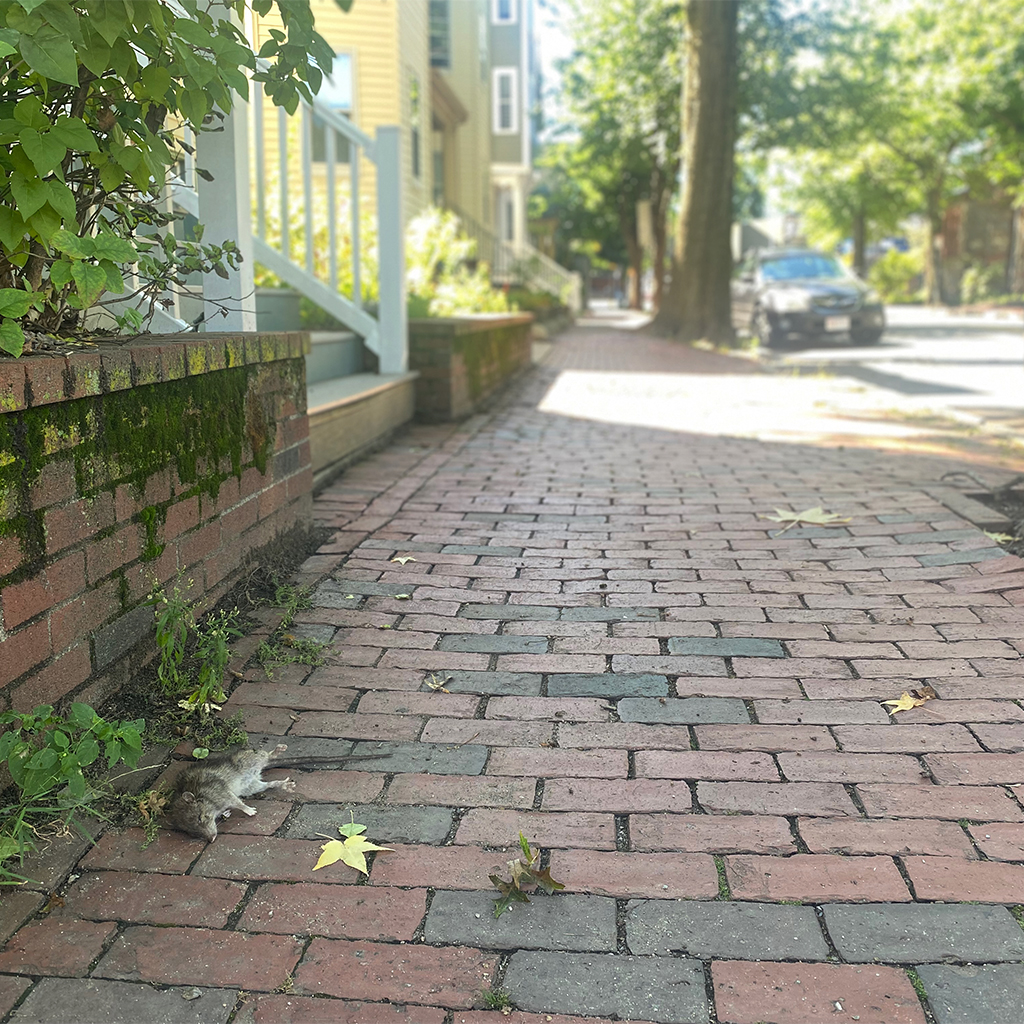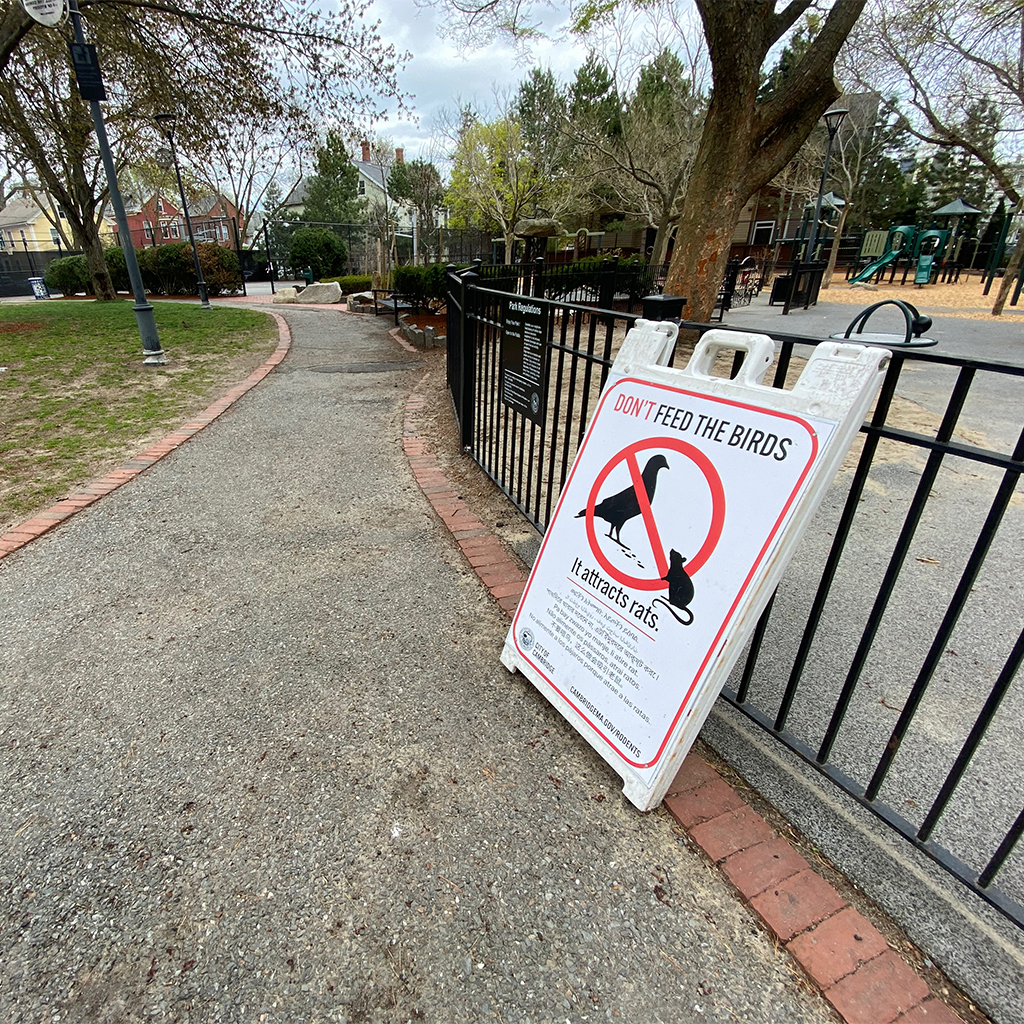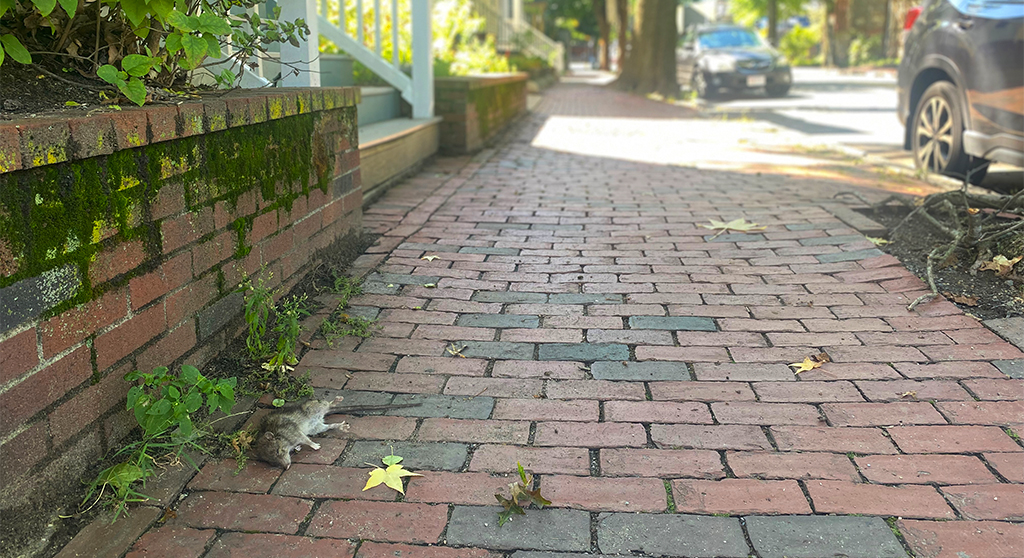Rat infestation complaints drop in Cambridge after combination of efforts, and more to come

The carcass of a rat on Beech Street in North Cambridge on Sept. 14. (Photo: Marc Levy)
Rat complaints to Cambridge staff are down dramatically, and city councillors say they’ve felt the change themselves.
Calls of rodent infestations peaked two years ago at 784 after they were added as an option to the SeeClickFix complaint system in 2020. This year, looking back over the past 365 days leading up to Nov. 23, the reports had dropped by half to 396.
“I used to sit in my backyard and rats would just run through – not great,” vice mayor Alanna Mallon said at the council’s Monday meeting. But not this year. “I myself saw a lot less rat activity this summer in my neighborhood.”
Mallon was just one of the councillors who once experienced rat problems firsthand. Quinton Zondervan had rats in his garage, and Patty Nolan called in a crew for help like another 245 homes citywide in the past year, leading to a reported 714 service visits this year with an average response time of 4.2 days, down from 10.8 days in 2019. Not only are their own rats gone, but councillors say they get fewer emails and calls from residents needing help.

A sign seen April 19 in Dana Square Park in Cambridgeport warns against inadvertently feeding rats. (Photo: Marc Levy)
Cambridge’s rat czar from the Inspectional Services Department, Dave Power – formally a project coordinator for environmental health – hesitated to take the win. He noted that it was possible that people “just throw their hands up because they don’t feel like they’re being heard,” and aren’t even calling for help.
There are reasons to believe in the data and the anecdotes, though, including the several programs put in place in recent years to fight the rat hordes rousted from their burrows by constant construction and drawn to the garbage from Cambridge and Somerville restaurants and homes.
In addition to the improved response times and rising numbers from Secured Environments, the contractor that goes to residents’ homes, the city has rolled out new trash carts and locking compost bins, installed “Big Belly” compactors in public areas to replace open trash cans and deployed nearly 100 devices that electrocute rats. The 64 aboveground “Smart Boxes” and 27 underground “Smart Pipes” have killed 2,440 of the creatures.
“It’s tough to tell if those are good numbers or if they’re just average numbers, but you know, it’s roughly 2,400 rats that we don’t see anymore,” said John Nardone, deputy public works commissioner.
“Not just one thing”
Homeowners who have a rat burrow onsite have had the option to try a carbon monoxide treatment in which the gas is pumped down, putting the animals to sleep gently but permanently. (Traditional traps are also available and rodenticide, which is increasingly shunned because the poison is transferred from rats’ bodies into those of their predators.) Five have tried it. Cambridge now owns it own Burrow RX machine, and Public Works and ISD expect to have rules in place to begin using it “by the start of next year,” according to a report from City Manager Yi-An Huang.
Inspectors now work with construction crews to bait for rats before demolition will send displaced burrows racing across Cambridge to find new homes, and increasingly the inspectors visit large non-demolition construction sites to look into reports of infestations too, the report says.
A group is also collaborating with counterparts in Somerville on slipping infertility drugs that affect only rats into the population to see if breeding rates drop. That test is expected to start in 2024.
“What we’ll find out with rodent control is, it’s not just one thing,” Power said.
Improvement possible
Councillors congratulated staff on the successes and found them open to considering an expansion of the house calls now limited to buildings of four units or fewer, and to making it easier for residents to swap out trash bins needing replacement.
In the current system, replacements are made on specific days and the resident needs to bring a defective barrel out on day that isn’t a trash day for them.
“We do need to change the way that we’re doing that. Probably the damage is caused by our own folks,” Nardone said. “We’ve gone through some growing pains.”




“Cambridge’s rat czar from the Inspectional Services Department, Dave Power …hesitated to take the win. He noted that it was possible that people ‘just throw their hands up because they don’t feel like they’re being heard,’ and aren’t even calling for help.”
Dave Power is clearly not a politician trying to get re-elected. For he speaks the truth plainly.
Take a walk down Bishop Allen, Columbia, Norfolk, Douglass or Cherry Street any night of the week. Completely over-run and disgusting.
Calls to the Rat Czar? Sure they are responsive. They send out a consultant to throw down some poison.
And then? Nothing. No pressure on the slum lords who don’t provide composting bins. No pressure on some slum lords who don’t properly maintain their dumpsters.
We gave up and moved out.
Next summer we will probably sell and take another below market rental off the table in Cambridge.
All because the rat problem has gone from bad to completely out of control in Central.